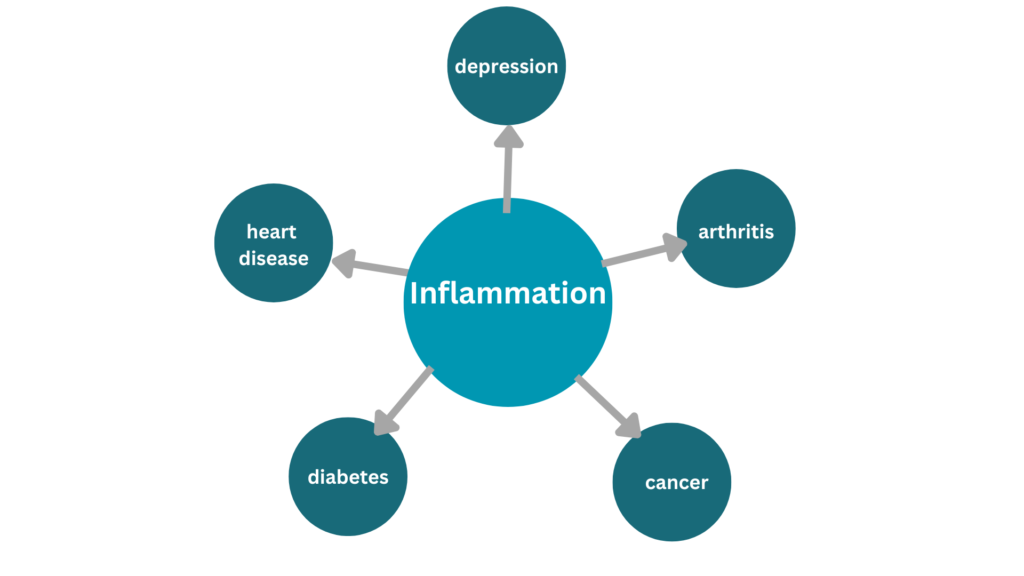Anti-inflammation
One cause, Many Conditions

The Role of Anti-Inflammatory Functional Medicine and Diet in Chronic Disease
Chronic inflammation is a critical factor in the development and progression of many chronic diseases. Functional medicine, which emphasizes a holistic approach to health, focuses on addressing the underlying causes of inflammation through diet and lifestyle modifications. This article explores the role of anti-inflammatory functional medicine and diet in managing chronic diseases, highlighting the benefits of various dietary components and supplements.
The Impact of Diet on Inflammation
Polyphenols in Fruits, Vegetables, and Whole Grains Polyphenols found in fruits, berries, vegetables, nuts, whole grains, and marine-origin foods play a significant role in mitigating chronic inflammation associated with various diseases. These compounds have been shown to reduce inflammatory markers and promote overall health (Wu & Schauss, 2012).
Anti-Inflammatory Properties of Dietary Compounds Compounds with anti-inflammatory activity present in the diet can alleviate inflammatory processes linked to unhealthy diets and diseases, thereby promoting healthy aging. These include flavonoids, spices, and specific fats that can modify inflammatory processes (Stromsnes et al., 2021).
Natural Products as Alternatives to Traditional Drugs Natural products such as polysaccharides, flavonoids, and polyphenols are being researched for their potential to replace traditional anti-inflammatory drugs. These compounds offer a safer alternative with fewer adverse reactions, making them valuable in managing chronic inflammation-related diseases (Deng et al., 2022).
Anti-Inflammatory Diet in Alzheimer’s and Chronic Diseases An anti-inflammatory diet can be particularly beneficial in modifying the inflammatory processes involved in Alzheimer’s disease and related chronic conditions. This approach not only helps in prevention but also in treatment (Gardener et al., 2015).
Supplements and Nutraceuticals in Inflammation Management
Dietary Supplements in Geriatrics Anti-inflammatory dietary supplements can help prevent diseases associated with inflammation in elderly individuals. These supplements potentially mitigate cellular changes and slow disease progression related to inflammation (Shrihari, 2018).
Phytochemicals and Nutrients Phytochemicals such as curcumin and resveratrol, along with nutrients like melatonin and vitamin D, play significant roles in preventing meta-inflammation. These nutraceuticals offer potential anti-inflammatory therapy for chronic diseases linked to inflammation (Farokhimanesh & Komeili, 2019).
Balancing Macronutrients and Omega-3 Fatty Acids An anti-inflammatory diet that balances macronutrients and optimizes the ratio of omega-6 to omega-3 fatty acids can significantly reduce inflammation. This dietary approach includes the intake of omega-3 fatty acids and polyphenols, promoting gene silencing and reducing inflammatory responses (Sears, 2015).
Personalized Approaches to Chronic Inflammation
Chronic Treatment and Lifestyle Modifications Managing chronic diseases caused by chronic inflammation requires ongoing treatment and lifestyle changes. Adopting an anti-inflammatory lifestyle is crucial for reducing inflammation and preventing the progression of chronic diseases (Aggarwal et al., 2016).
Reducing Biomarkers of Inflammation An anti-inflammatory diet plays a significant role in reducing biomarkers of inflammation, which is essential in preventive medicine. This dietary approach can help lower the risk of inflammation-related chronic diseases (Greer, 2012).
The Future of Anti-Inflammatory Functional Medicine
The integration of anti-inflammatory dietary strategies into mainstream healthcare can lead to significant improvements in managing chronic diseases. By focusing on functional foods, personalized dietary supplements, and comprehensive lifestyle interventions, functional medicine offers a promising path to reducing chronic inflammation and promoting overall health.
For those interested in exploring the benefits of anti-inflammatory functional medicine, these studies provide valuable insights into effective strategies for managing chronic inflammation. Incorporating these practices into daily routines can help mitigate the effects of chronic diseases and enhance overall well-being.
References
- Wu, X., & Schauss, A. (2012). Mitigation of inflammation with foods. Journal of Agricultural and Food Chemistry, https://dx.doi.org/10.1021/jf3007008
- Stromsnes, K., Correas, A. G., Lehmann, J., Gambini, J., & Olaso-González, G. (2021). Anti-Inflammatory Properties of Diet: Role in Healthy Aging. Biomedicines, https://dx.doi.org/10.3390/biomedicines9080922
- Deng, W., Du, H., Liu, D., & Ma, Z. (2022). Editorial: The Role of Natural Products in Chronic Inflammation. Frontiers in Pharmacology, https://dx.doi.org/10.3389/fphar.2022.901538
- Gardener, S., Rainey-Smith, S., & Martins, R. (2015). Diet and Inflammation in Alzheimer’s Disease and Related Chronic Diseases: A Review. Journal of Alzheimer’s Disease, https://dx.doi.org/10.3233/JAD-150765
- Shrihari, T. (2018). Anti-Inflammatory Dietary Supplements in Prevention of Diseases. Gerontology & Geriatrics Studies, https://dx.doi.org/10.31031/GGS.2018.01.000522
- Farokhimanesh, S., & Komeili, A. (2019). Nutraceuticals with pleiotropic anti-inflammatory functions for mitigating meta-inflammation. International Journal of Molecular Sciences, https://www.ncbi.nlm.nih.gov/pmc/articles/PMC6617397/
- Sears, B. (2015). Anti-inflammatory Diets. Journal of the American College of Nutrition, https://dx.doi.org/10.1080/07315724.2015.1080105
- Aggarwal, B., Sundaram, C., Prasad, S., Reuter, S., Kannappan, R., Yadav, V., Park, B., Kim, J., Gupta, S. C., Phromnoi, K., & Sung, B. (2016). Chronic diseases caused by chronic inflammation require chronic treatment: The anti-inflammatory lifestyle. Advances in Experimental Medicine and Biology, https://dx.doi.org/10.1201/b11014-15
- Greer, A. (2012). An anti-inflammatory diet: The next frontier in preventive medicine. Current Sports Medicine Reports, https://dx.doi.org/10.1097/01720610-201202000-00007